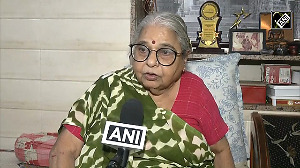In an attempt to counter the growing consensus in both Washington and New Delhi that there is a perceptible drift in the envisaged United States-India strategic partnership, India's ambassador to the United States Nirupama Rao asserted that there cannot always be "big bang" initiatives or consistent red-ribbon cutting ceremonies.
For Rediff Realtime news on Indo-US ties, click here
Delivering the keynote address at a conference organised by the George Washington University's Sigur Center for Asian Powers, titled 'India as a Global Power: Contending Views from India', Rao argued that US-India relations "have transformed in a dramatic way and in a very short time".
"In this context, I might add that we are also a victim of our own success. While we may all want it, it is also true however that we will not always have 'big bang' initiatives or cut red ribbons at all times," she said.
"Our multi-faceted partnership covering almost every field of human endeavour, is now on a steady, onward course. Our governments are committed to further deepen and expand the horizons of our partnership and to realise its enormous promise, bringing our people closer and achieving our shared aspirations and goals."
"But sometimes a few observers tend to mistakenly view this as a 'slowdown' of our relationship. On other occasions a difference of views on some of the global developments is mistaken as a sign of discord or a reflection of 'old habits' on India's part," she bemoaned.
Rao said, "This to my mind is not only incorrect but also unhelpful. Such characterisation also obviously ignores the fact that fundamental reasons that have led to transformation of our ties -- our converging security and economic interests, vibrant ties between our peoples and mutually beneficial connections among our entrepreneurs as well as our faith in ideals of democracy, individual liberty, rule of law -- not only still remain in place but have actually become more compelling."
The ambassador said, "As I look at the year ahead, I believe that both governments must work with focus to qualitatively improve this relationship," and added: " As my friend, Ambassador Karl Inderfurth (former assistant secretary of state for South Asian Affairs in the Clinton administration) noted recently, we need to consolidate, we need to implement."
"Our development partnership in education, health, in agriculture, science and technology, and clean energy must be strengthened. Ties between our States should be consciously promoted. Our homeland security dialogue must be further consolidated. Our dialogue on export controls and high technology trade must gather further momentum and show results."
And, on the US-India civilian nuclear deal, which has remained in limbo in the wake of the US administration and American business and industry's angst over the nuclear liability law passed by the Indian Parliament, Rao said, "We need to intensify our efforts in the working group that has been set up to deal with liability issues so as to enable the early activation of the agreement and the participation of US nuclear energy companies in this sector that is so important for our energy security."
She was also hopeful that "the discussions on the bilateral investment treaty will move forward," and that "the upcoming March visit of Commerce Secretary (John) Bryson to India is targeted at enabling the realisation of commercial opportunities for US companies in the infrastructure space in India, covering roads, railways, airports and energy."
Rao pointed out that Indian companies are already investing in a growing number of US states, bringing value, creating jobs for Americans, and integrating with local communities.
Consequently, far from falling by the wayside, the ambassador asserted, " I have no doubt that our strategic dialogue will intensify further, particularly in regard to regional issues and the situation in Asia, and that it will provide an impetus for peace and stability, and economic growth."
In this regard, she said, "Our External Affairs Minister (S M Krishna) looks forward to the next strategic dialogue meeting with Secretary (of State, Hillary) Clinton in Washington this summer."
Earlier, Rao said, "We have also been fully supportive of US efforts to fight terrorism in Afghanistan and to bring stability there. In this regard we are keenly watching recent efforts for a political dialogue. While we agree that ultimately there would have to be political solution, we also believe that this should not become an over-riding objective that needs to be achieved at all costs for that would risk the prospect of the victory of the dark forces of terrorism and extremism that have plagued the region for long."
"Let us not wait for the dusk and the owl of Minerva to spread its wings, with awareness coming too late. Too much is at stake both for Afghanistan, and for our region in what happens in that country," she added.





